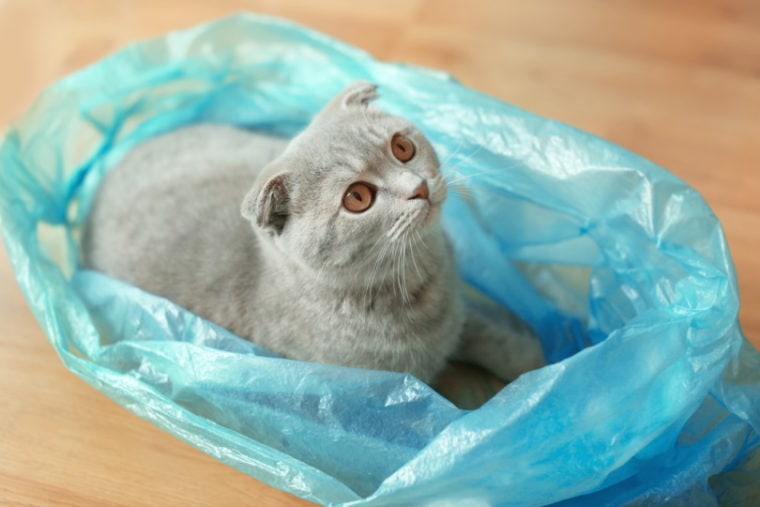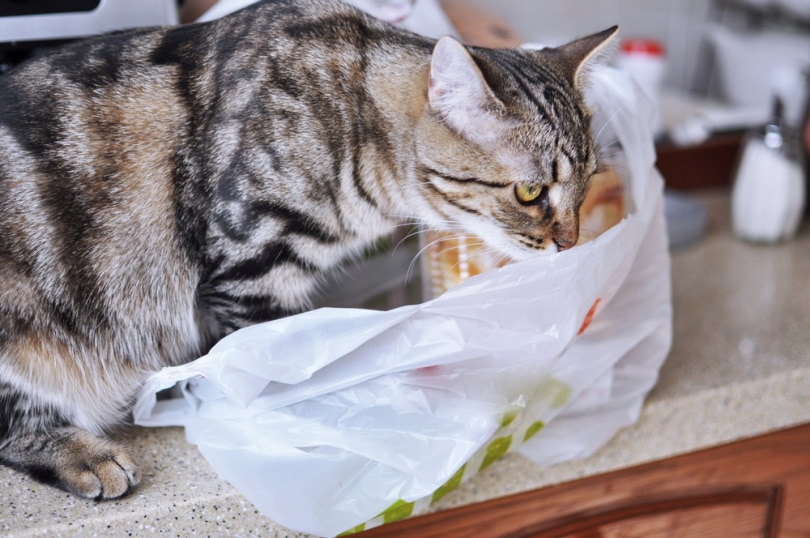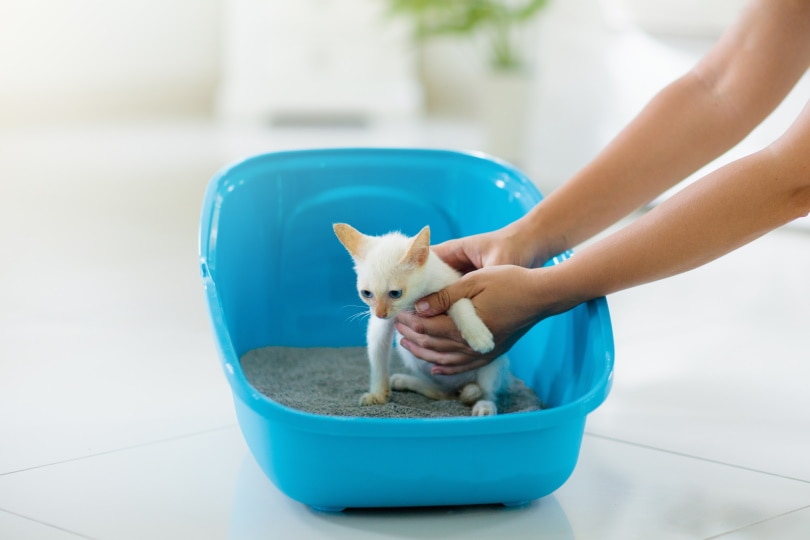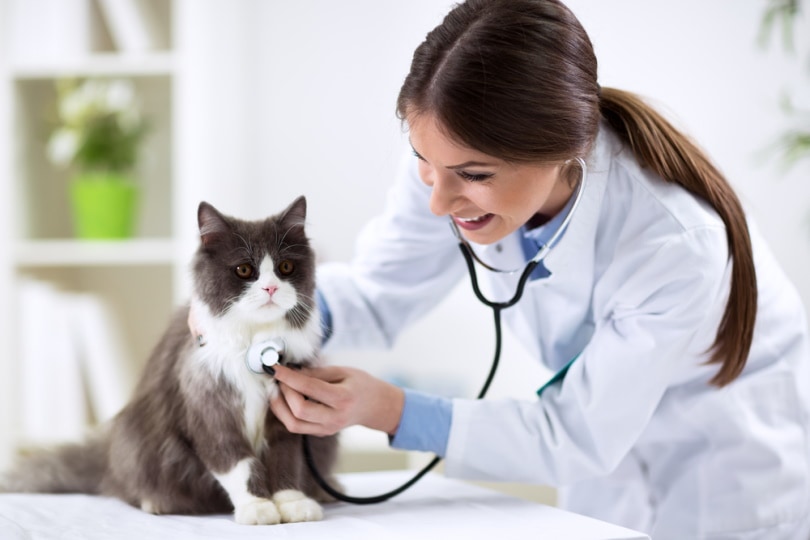
Sometimes, our pets do the most inexplicable things. While we love our cats and their adorable antics, they can sometimes be totally weird. So, what is up with cats that pee on plastic bags?
If you’re the cat owner who seems to choose a plastic bag over the litter box, you’re probably a little frustrated. While we can’t know exactly what’s happening inside your cat’s head, here, we go over the most common theories on why cats might pee on plastic bags, along with a few solutions.
The 7 Reasons Why Your Cat Might Pee on Plastic Bags
1. Medical Issues
If your cat is peeing on a plastic bag or anywhere but inside the litter box, it could be a sign of a medical problem. They might be urinating too often and just peeing wherever they happen to be. Or they might be associating the litter box as the source of the pain and are avoiding using it.
A plastic bag is a soft surface that a cat might believe is a safer and more comfortable place to urinate on.
Medical issues that can affect how a cat urinates include:
In most cases, you’ll notice other signs of a problem beyond your cat peeing on a plastic bag. If your cat is straining to pee, vocalizing frequently, or otherwise showing signs of pain and seems to be urinating frequently, you should immediately take your cat to the vet.
Many of these medical conditions are life-threatening and need treatment as soon as possible.
2. Enticing Smells
When cats are drawn to plastic bags, it might be due to the chemical makeup of the bags.
When some plastic bags are manufactured, tallow (rendered animal fats), petroleum, and gelatin are sometimes used. Perhaps cats are drawn to plastic bags because they like how they smell. The bag could have leftover food smells, so your cat is naturally drawn to it.
So, if you find your cat licking and chewing—and peeing—on a plastic bag, they might respond to the enticing scent.

3. Enticing Sounds
Cats seem to love crinkling sounds. Many cat toys have material inside that sounds similar to the crinkling of a plastic bag. But why do cats react so strongly to this sound?
It’s thought that crinkling noises mimic the rustling sounds of prey. Mice, birds, and bugs make these sounds in grass and leaves, which can trigger a cat’s hunting instincts.
4. Enticing Texture
Plastic bags might feel softer and warmer on your cat’s paws, especially in comparison to some litters.
Also, if you currently use litter box liners or have in the past, your cat might associate a plastic bag with a similar texture to plastic liners and decide that this is where they’re supposed to urinate.
5. Litter Box Issues
There are a few factors that can lead to a cat deciding they don’t want to use their litter box.
For one thing, the location of the litter box is crucial, particularly for some cats. The litter box must be in a quiet and stress-free area. If it’s close to where there’s activity, noise, or potential threats (like next to the washing machine or close to the front door), your cat might get stressed out about using it and start urinating in inappropriate places.
Then, there’s the litter box itself. It should be big enough for your kitty to comfortably stand up and turn around in. Most cats would prefer a large litter box over a small one.
If you have a senior cat, you’ll need to ensure that the litter box is easy to get in and out of. If it has high sides and your kitty has arthritis or another mobility problem, leaving and entering the box might be painful and difficult. Look for litter boxes with a low entrance.
Does your litter box have a hood? Some cats don’t like the enclosed space because it could leave them feeling trapped with only one place to escape. A hooded litter box traps the nasty odors that we don’t want drifting around our home, but it forces your cat into the stinky area.

6. Litter Issues
If it isn’t the litter box, it could be the litter. You should regularly clean the litter box because some cats will refuse to use it if it’s soiled. Try scooping once a day, and empty and clean the box once a week. Refill it with fresh litter. Some cats might even expect you to scoop every time that they use the litter box! You’ll need to do whatever your cat needs.
It might also be the kind of litter that you’re using. The ancestors of domestic cats lived in the desert, so most cats today prefer fine, sand-like litter. It should be soft on the paws and easy to dig into. Try different textured litters and see which kind your cat prefers.
Additionally, cats prefer unscented litter over litter with a strong fragrance. Cats have sensitive noses, and getting into a strong-smelling litter box (clean or not) can be off-putting for many cats.
7. Marking Territory
This is more typical in a multi-cat home or if there’s been a change in the household that has stressed out your cat. Cats will urinate in different locations around the house to mark their territory. It can make your cat feel more at ease when their pheromones are released around their territory.
If you have multiple cats, ensure that you have one litter box for each cat, plus one extra. So, if you have four cats, you need five litter boxes. If you only have one cat but live in a home with multiple floors, you might want to consider placing a litter box on each floor.
- ADVANCED ENZYMATIC CLEANER - Penetrates the most stubborn smells and stains at the deepest molecular...
- FOR ANY MESS, ON ANY SURFACE - This pet odor eliminator cleans your carpets, floors, furniture,...
- FRESH, NATURAL ODOR - Our unique formulation doesn't rely on dangerous or unpleasant chemical...
If you're over your house smelling like you've got a pet, it's time to check out the Hepper Advanced Bio-Enzyme Pet Stain & Odor Eliminator Spray! It removes even the most stubborn smells and stains and comes with a 100% satisfaction guarantee. Click here to find out more about this amazing product.
At Pet Keen, we’ve admired Hepper for many years, and decided to take a controlling ownership interest so that we could benefit from the outstanding products of this cool cat company!
It Might Be a Combination of Reasons
Your cat peeing on plastic bags might be for more than one reason. It might be a combination of your cat disliking their litter and being drawn to the plastic bag because of the scent and texture.
Your next step is to determine the cause of the behavior and come up with a solution.
Ruling Out Medical Issues
Before you do anything, you might want to consult with your vet in order to rule out any medical problems. This should be done as soon as possible if there are other worrying signs or if your cat suddenly started this behavior when nothing changed in their environment and your cat otherwise seems normal.

Behavioral Issues
Once you’ve established that there’s nothing medically wrong with your cat, you’ll need to address the behavioral problem. You can ask if your vet can do a house call, as they can assess your home and environment to pinpoint the problem.
If this isn’t possible, you can hire an animal behaviorist to assess your home and cat. They can offer suggestions that should help curb the inappropriate elimination before it becomes a habit.
When Nothing Is Working
If you’re still having issues, try using a litter box without any litter at all. If your cat seems to only want to urinate on plastic, let them do so. At least this way, it will be contained within the box rather than on the floor.
Also, don’t leave any plastic bags on the floor. If your cat still uses the litter box and only pees on a bag when one happens to be there, try to make sure there are never plastic bags lying around.
Remember not to punish your cat. That will only make them fear you and other behavioral issues will likely arise. Use positive reinforcement only.
Final Thoughts
There are many reasons that your cat could be peeing on plastic bags. It could be medical or behavioral, so make a point of looking at your cat’s environment from their perspective. Is the litter box too small, or does the litter look like it might be uncomfortable to walk on?
Talking to your vet and taking a sympathetic approach to try to understand your cat better will go a long way toward stopping this peculiar habit — hopefully, for good!
Featured Image Credit: Africa Studio, Shutterstock








